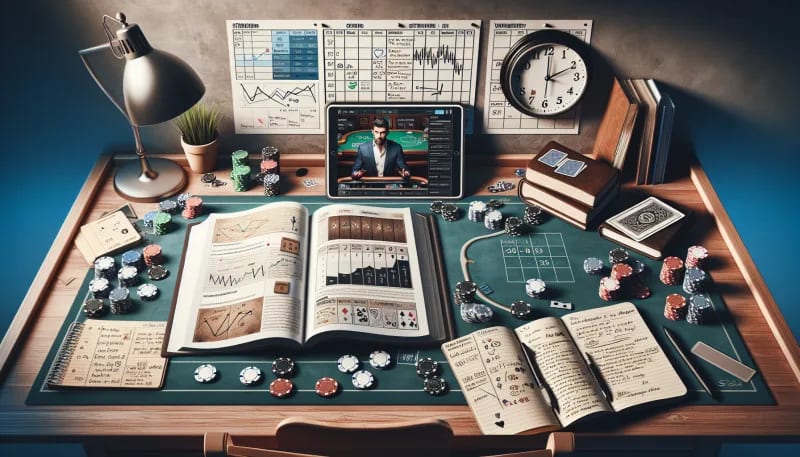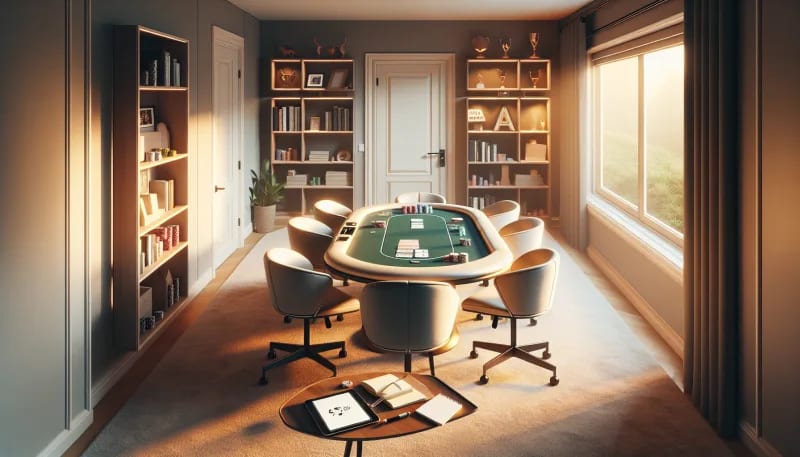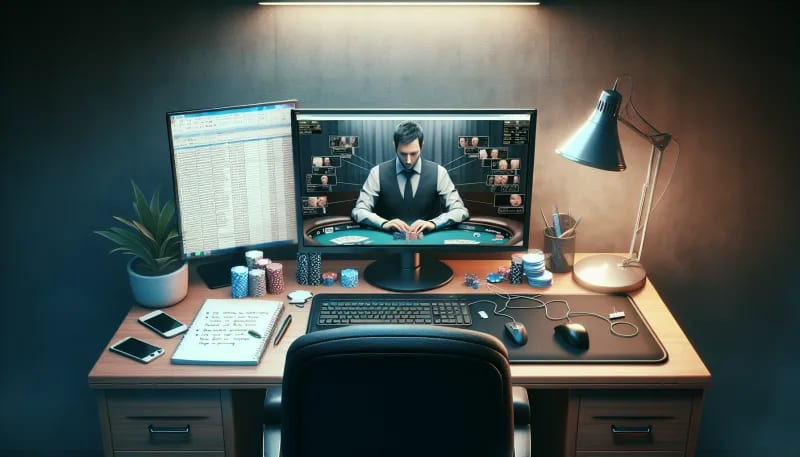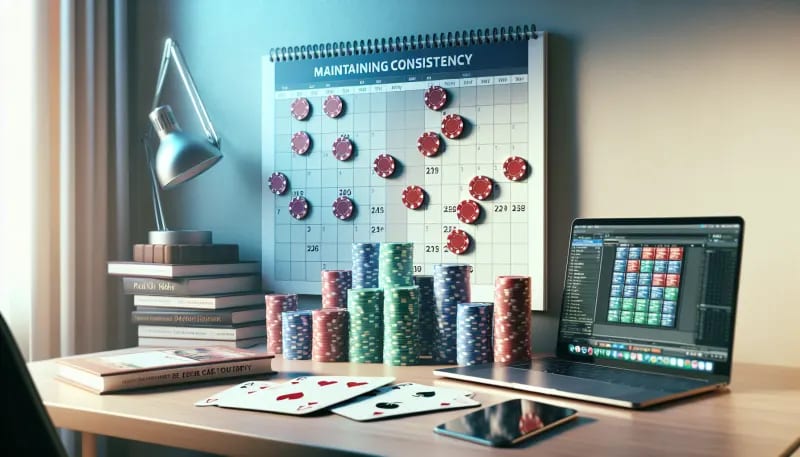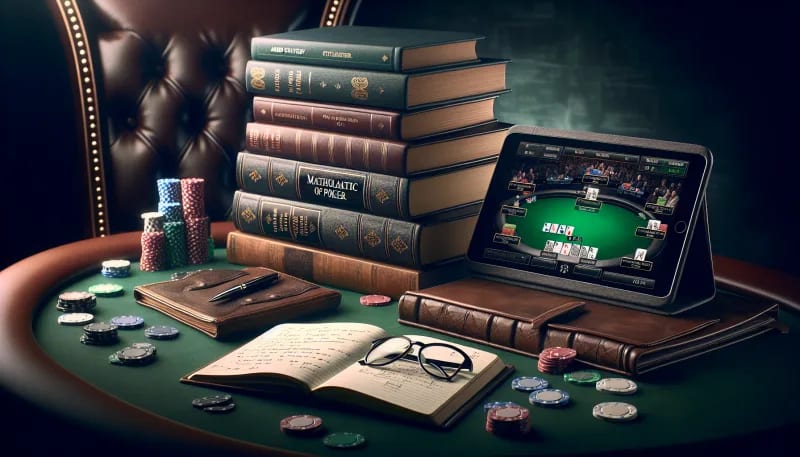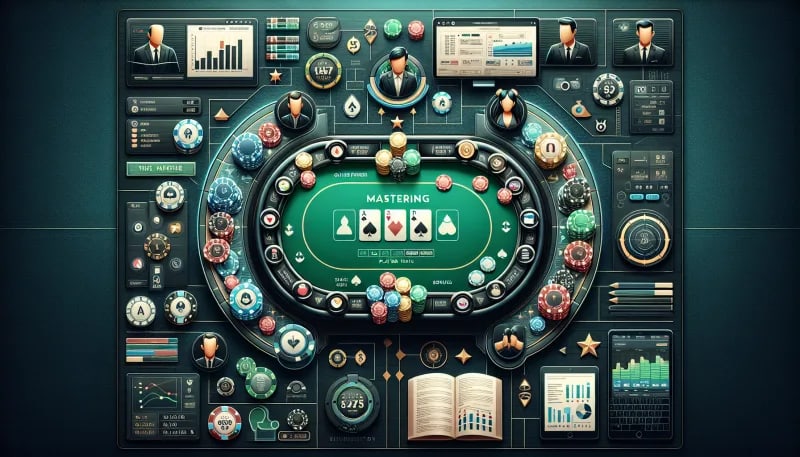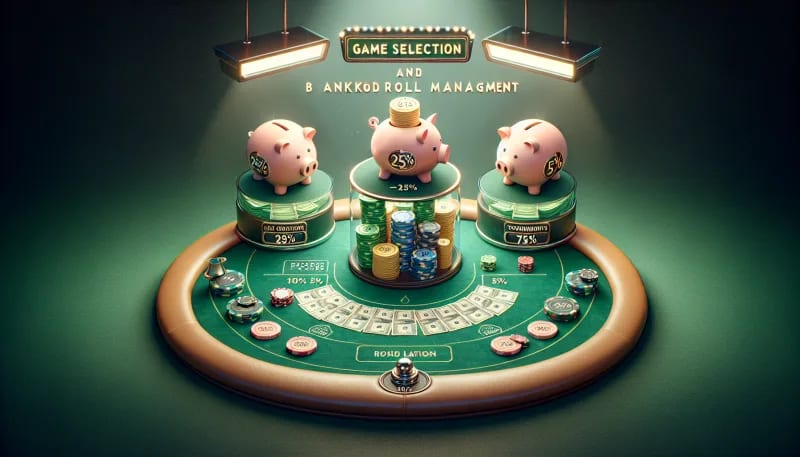Second Income from Poker: Mastering the Game for Financial Gain
Finding Time to Play Poker
So, you want to juggle poker with a hectic life? Easy, if you're a time-traveler or have figured out human cloning. For us mere mortals, it's about getting clever with the clock. I know what you're thinking: "How can I possibly fit daily poker sessions into my packed schedule?" Strategy, my friend.
Think of it as the art of war against time. Consistency does indeed trump all. Even if you're only logging on for a brief stint, daily play is essential. Short on hours? Let's make those minutes count.
Dip in daily, even if it's just for your morning coffee's worth. Trust me, piling up those short sessions adds up. Now, onto the next level of time-bending — multitabling. Yes, playing multiple tables at once can feel like juggling flaming chainsaws, but who said becoming a poker champ was child's play?
Here's a quick checklist for you aspiring multitablers:
- Start with two tables. Keep it manageable.
- Add more once you stop confusing your pocket aces with pocket raisins.
- Stay sharp; more tables = more chances to miss something.
And for the speed demons, there's something even faster. Ever heard of Zoom tables? They're the autobahn of the poker world. As soon as you fold, whoosh, you're whisked away to a new hand. Efficiency at its finest.
Speaking of efficiency, this is not only good for cramming more hands into your lunch break, but it's a fast-track to improving skills. You know, practice makes perfect and all that jazz. But let's not forget — variety is the spice of life.
Aiding in skill development, sure, but it's also about keeping that flame for the game burning brightly. Who wants to fall out of love with the game before even mastering the poker face?
So, you've carved out time for play, but what about study? Let's segue into Studying Poker Strategies, because, like sunscreen, it's something you'll thank yourself for later.
Studying Poker Strategies
So, you've carved out time in your packed schedule for playing poker, as we discussed earlier. What's next? Studying, of course. But come on, who actually likes to hit the books? The truth is, in poker, the real hustlers are those who bury their noses in theory when they’re not stacking chips at the tables.
Why study, you ask? Simple. To not be the fish at the table, my friend. In the early days of your poker journey, devouring strategies is as crucial as feigning confidence after a bad call. The poker greats weren't born with a silver chip in their hands; they studied their way to the top.
And where should you start? The classics, naturally. There’s a treasure trove of poker literature out there:
- Doyle Brunson's "Super System" – a holy scripture for poker enthusiasts.
- Dan Harrington's "Harrington on Hold'em" – for the tournament grinders.
- David Sklansky's "The Theory of Poker" – if you want to get serious about odds.
Online courses are the new kids on the felt, offering interactive lessons that simulate real table experience. Sites like Upswing Poker and Run It Once turn weekend grinders into weekday warriors with ease.
Then there's the endless rabbit hole of hand analysis forums. A wonderland where enthusiasts dissect plays like a final exam, arguing whether that all-in was gutsy or just plain insane. Places like TwoPlusTwo or CardsChat are your go-to for that sweet, sweet peer review.
Remember, practical application is where the rubber meets the road. We're not aiming to become the poker equivalent of armchair quarterbacks here. Apply those strategies on the felt, tweak, and repeat. It's the cycle of study.
Finding balance is key. Too much play without study is like winking in the dark – you know what you’re doing, but no one else does. Allocate some weekend time for intensive study sessions. Trust me, your Monday self will thank you.
Alright, once you've stocked up on strategies, what's the next hurdle? Eliminating Distractions – because nothing spells disaster like a Netflix binge mid-hand. But more on that next time.
Can you really improve by splitting your life between the books and the baize? As they say in poker, you’ve got to play the hand you're dealt. Let's make sure it's a good one.
Eliminating Distractions
So, we've covered Studying Poker Strategies, and you're now armed to the teeth with the latest and greatest plays. But what's the point if every time you sit down to play or study, you're bugged by the incessant pinging of your phone or the alluring glow of the TV? Right, there is no point.
Creating a Zen-like poker haven is critical, friends. Here's what I do: I dedicate a room where the walls whisper tales of royal flushes and full houses. No kitchen tables for this card shark – the stakes are too high for such casual settings. And, trust me, relegating yourself to a 'poker corner' can save your sanity.
I have a ritual: turn off all unnecessary devices. Because, do I really need to know about Aunt Mabel's cat's birthday party while on the grind? I think not. Phones, tablets, even that smart fridge that seems to have more opinions than I do – they all get the silent treatment.
Minimizing screen distractions? You bet. My computer has precisely two states of being: poker study mode, and off. That's it. No social media tabs seducing my attention away like sirens of the screen. I keep it simple:
- One monitor, not the NASA command center I used to think I needed.
- Browser notifications? Disabled.
- Work emails? Ignored.
Can an environment actually hone your focus during what I lovingly call 'the precious limited poker time'? I'm a skeptic by nature, but even I can't deny the results. When there's just me, the chips, and the cards, something clicks – usually, it’s my win rate going up.
And speaking of time, let's talk Utilizing Work Time for Poker Study in the next section. Because let's be real, if you're like me and consider multitasking to be a mythical beast, you'll need all the help you can get.
Utilizing Work Time for Poker Study
Remember our chatter about eliminating distractions? Good. Now let's sneak in some poker study between those Excel sheets. But ssshh, let's keep it on the down-low and, of course, stay professional.
First off, reviewing theory. I mean, a quick peek at pot odds during that boring conference call won't hurt, right? And who decided spreadsheets can't secretly hold poker statistics? Just be careful not to shout "Bingo!" at a full house.
Instructional videos can be trickier but doable. Got a lunch break? Perfect time for a 10-minute video on bluffing strategies. Keep one ear open for the boss, though. Seriously, those headphones can be lifesavers—or job savers.
Engaging in forum discussions is a bold move, I must say. Can you alt-tab like a ninja? Then you might slip in a thoughtful post during a short breather. Remember, one eye on the hand rankings, one eye on the door.
Now let's list the dos and don’ts:
- Do use incognito tabs for your poker studies. Why? Ever heard of browser history?
- Do have work-related tabs ready to switch. Just in case.
- Don't get too engrossed. Your paycheck depends on it.
- And don't forget to actually do work. Seriously.
Responsible, discreet, and beneficial—juggling work and poker study is an art. But ask yourself, will your productivity stay afloat? Or will you be the Titanic, hitting an iceberg mid-flop?
Prepping for that after-work poker session while the boss drones on about synergy might just edge your game up. But who am I kidding? We're all model employees here. Right?
Keep the poker studying subtle, and nobody will ever suspect a thing when you casually mention you've been folding more than paper recently.
Oh, and speaking of keeping one ear open, have you considered blending poker learning with your playlist? Transitioning from the mouse-clicking symphony, why not venture into Leveraging Poker Podcasts during the commute? Et voilà, your poker IQ skyrockets while you're stuck in traffic. Genius.
Leveraging Poker Podcasts
Transitioning from maximizing work hours for poker study, let's plug into the world of podcasts. Ever wonder what you could achieve with all that precious commute time? Cue poker podcasts. They're the unsung heroes for players stuck in traffic, acting as a goldmine of poker savvy.
Who knew that being sandwiched between a semi-truck and a honking SUV could transform you into the next Phil Ivey? Podcasts offer a buffet of expertise—from whimsical bad beat stories to deep strategy discussions. Imagine replacing road rage with a calm analysis of pot odds.
Here's what's on the menu:
- Interviews with the who's who of poker
- Hand history breakdowns
- Mental game pep talks
- Bankroll management advice
Chew on this: A podcast highlight could be the brainwave that unlocks a new level in your game. However, let's not kid ourselves too much. You won't morph into a poker whiz just by osmosis. Or, will you?
Is it really learning if you're simultaneously wondering whether you left the coffee maker on? There's the rub. Staying engaged with a voice amidst honking horns is an art. Could you recount the seven different types of poker players discussed in episode 23, or just that the host's laugh sounds like your Aunt Tilda?
But, hey, if you're going to zone out anyway, have it be to something that might sprinkle some magic on your poker game. The right insight at the right moment can be as satisfying as hitting your set on the flop.
So, before we dive into 'Maintaining Consistency'—the next lodestar on our journey to poker stardom—remember that podcasts could be the snackable strategy sessions your game is starving for. Keep your ears open, you might just catch a morsel that changes your game forever. Or at least until you hit the next traffic light.
Maintaining Consistency
Let's face it, in poker, like in those awkward family photos, consistency is key. Could you imagine only smiling once a year? Your face would forget how! Poker's the same. You can't just play or study whenever you feel like it and expect to rake in the chips like leaves in autumn.
Remember how we chatted about leveraging poker podcasts? Keep those on repeat! Nothing says dedication like absorbing strategic chatter while doing the dishes. But podcasts alone won't keep your game sharper than a shark's tooth. You've got to be in it to win it - quite literally.
So, how do we stick to the felt regularly? Easy!
- Schedule your poker sessions like you'd schedule a hot date - non-negotiable.
- Review hands even on 'Meh' days. Yes, even if your favorite series just dropped a new season.
And here's a tough love nugget: losing streaks? They're as inevitable as taxes. But playing and studying through those rough patches is what turns a weekend player into a bona fide card-slinging pro. Are you going to let a bad beat dictate your commitment? I didn't think so.
Plus, think about bankroll growth. It doesn't crave spontaneous thrills; it needs a steady diet of calculated risks and well-practiced strategy. Your bankroll's like a plant - neglect it, and you'll be left with, well, nothing much.
As we inch towards our next topic, Financial Management and Goal Setting, remember: consistent play is about more than just clocking in hours. It's about quality time with the cards. Set specific, realistic goals. I mean, aiming to own a yacht in a month is a teensy bit ambitious, no?
So, shall we stay consistent and travel on this journey from wannabe to wizard at the tables? After all, inconsistency is the only consistency that'll consistently lose you money. And nobody wants that, right? 🃏🧙♂️
Financial Management and Goal Setting
Let’s be honest, we’ve all dreamt of hitting that royal flush and watching as our bank account rockets to six figures. But wake up, we’re not in a casino movie; we’re in the real grind of financial management in poker. The reality? It’s more like a slow dance than a wild tango.
Maintaining consistency in your poker game is one thing, but without sound financial management? You might as well be flushing money down the toilet. Playing within your means is the cardinal rule, folks. Don't be that person who thinks a hot streak negates the need for budgeting. You’ve seen that guy, the one suddenly living in his car because he thought he was too good for a bankroll strategy. Yeah, no thank you.
So here’s what you do. Establish a bankroll that fits your financial situation—a sum you can afford to lose without ending up on noodle diets for the next six months (though, ramen does have its charm). Consider these guidelines:
- Don't play above your limits. Sounds like a no-brainer, right? Yet, how many sob stories start with, "But I felt lucky..."?
- Set a stop-loss limit. Have you ever chased losses only to dig a deeper hole? I thought so. Learn from that mistake.
- Have separate accounts for poker and living expenses. Because, obviously, rent won't pay itself when you've gone all-in one too many times.
Setting realistic monetary goals for each poker session helps keep you in check. Aim to gradually increase your bankroll, not double it overnight. Remember, this isn't the lottery. A successful poker investment strategy involves patience and calculated moves, not whims and fantasies.
Now, juxtaposing the rules of financial acumen with the world of poker may feel a bit like trying to fit a square peg into a round hole at times. But let me tell you, it's the difference between playing another round and playing for bus fare home.
Next up: Choosing Between Live and Online Poker. Is the thrill of the felt under your fingertips netting you more wins, or is the click of a mouse in your PJs the real jackpot? Stay tuned to find out how your choice impacts your play, your winnings, and of course, your bankroll.
Choosing Between Live and Online Poker
So, we've talked about minding your bankroll and setting poker goals. But where should you put your hard-earned chips into action? Live or online poker? Ah, decisions, decisions.
Live poker is like the grand opera of card games. It's got the drama, the face-to-face confrontations, and you get to actually touch the chips. You can't replicate that shuffling sound online, can you? But let's face it, it's not all high notes:
- Travel: Planes, trains, and automobiles. Oh, and hotel rooms if you're going beyond the local casino.
- Food: Unless you have a penchant for casino nachos, eating out can put a dent in your wallet.
- Time: The one thing you can never bluff your way into having more of.
You've got to factor these in. After all, we've just finessed our financial management skills, right?
Then there's online poker. Your sofa is your throne, and your laptop or phone is the realm you rule. Accessibility is king here, folks:
- Convenience: Play in pajamas. Who's judging?
- Variety: So many sites, so many games. From penny stakes to nosebleed limits, 24/7.
- Cost-effective: No need for that second mortgage just to afford the snack bar.
Sure, some say it lacks the je ne sais quoi of live play. But hey, what's not to love about winning a pot while you're in your favorite cartoon slippers?
So, which suits your lifestyle and goals? Are you the kind who thrives on live action? Or do you prefer to grind it out online, with the cat as your only spectator? Maybe mix it up? Why not a little column A, a little column B?
Remember, whether you're live or online, it's all leading to the next part: Continuous Learning and Improvement. Because it doesn't matter where you play if you can't read a bluff or fold a hand when you're beat. Right? Right.
Continuous Learning and Improvement
Shifting gears from that age-old debate of live versus online poker, isn't it funny how we always seem to think we've figured it all out? Yet, there I am, nose-deep in another poker book, watching the umpteenth hour of gameplay videos. Why? Because in poker, like in any other serious endeavor, resting on your laurels is the fastest way to get left behind.
Let's be real for a second – poker can be as unpredictable as my Aunt Margie's mood swings at Thanksgiving. But here's the kicker: what separates the poker aficionados from the novices isn't just a good poker face; it's the commitment to never stop learning.
Think about it. You'd keep an eye on upgrades on your gadgets, right? Well, upgrading your poker intellect is no different. I'm talking about gobbling up books by poker experts, the kind that make you go, "Aha!" in the middle of the night. You know the ones right?
Here's a quick rundown of essentials:
- Strategy: Get those books that dissect every play like it's a frog in biology class.
- Videos: Watch gameplay footage like you're binge-watching your favorite series. Spoiler: the plot twist is you winning.
- Mindset: Soak in the wisdom of poker sages – mindfulness, patience, and when to fold 'em.
Let's not sugarcoat it; patience is a virtue, but in poker, it's practically a superpower. How often do you see someone charge ahead without a second thought and crash and burn? Just like a tortoise in a marathon, slow and steady study could very well spike that bankroll.
And just when you think you've become the Yoda of poker knowledge, remember the learning curve is steeper than a cliff dive. But hey, pull up a seat, crack open those poker tomes, and let’s keep that bankroll climbing.
Moving on, let’s shuffle over to Online Poker Strategy – because let's face it, playing on the web is a whole different beast, and we've got some taming to do.
Online Poker Strategy
So, you've committed to the grind and you're all about continuous learning and improvement? Now, let's talk brass tacks: online poker strategy. It's like trying to find a needle in a haystack, except the needle is a winning hand and the haystack is the internet.
First, the right sites matter. I mean, you wouldn't fish in a swimming pool, would you? Look for sites where the river flows with fishes, rather than the sharks. Bonus points if the site has a VIP program that doesn't require a PhD to understand.
Next up, the eternal debate: cash games or tournaments? Well, consider this:
- Cash games offer consistent income, a pick-up and play element, and that sweet, sweet instant gratification.
- Tournaments, on the other hand, are the marathons of poker, with bigger paydays and more dramatic swings.
Choose your battlefield wisely because each comes with its own set of war scars. And, do you really want to be that war veteran who never actually wins?
Now, improve your win-rate and hourly rate. Sounds like corporate jargon, but in poker, it's your bread and butter. Every percentage point, every dollar counts. Keep refining those strategies, charting those hands. Are you getting better or just getting by?
And let's talk about the "less-skilled recreational players"—our beloved fish. You need to spot them like a hawk spots a field mouse. They're your golden tickets, your path to padded bankrolls. But remember, every shark was once a fish. Don't get cocky, kiddo.
As we gear up to dive into Game Selection and Bankroll Management, remember this: strategy is not set in stone. It's more like Play-Doh. You mold it, you shape it, and sometimes, it just sticks to the carpet no matter how hard you try to clean it up. Keep adjusting and, who knows, maybe you'll find that mythical creature known as a "consistent winning strategy." Or a unicorn. Whichever comes first.
Game Selection and Bankroll Management
So, we've covered the intricacies of online poker strategy, but what's the big deal if you can't pick the right game or manage a buck to save your life? I mean, it's all well and good knowing your pot odds, but if you're sitting at a table with sharks while your bankroll takes a nosedive, those odds won't mean squat. Let's cut to the chase and talk game selection and bankroll management – the bread and butter that keeps you in the game longer than a New Year's resolution.
Picking Your Poker Playground
With gazillions of games running 24/7, how do you pick your poison? Do you jump into the high-stakes cash game with the big boys, or do you stick to the small pond with the tadpoles? Here's a clue: it's not just about the size of your ego.
Consider these factors:
- Player Skill Level: Are you the predator or the prey?
- Game Type: Cash, tournaments, Sit & Go’s – what's your flavor?
- Rake Structure: Are you giving back your winnings in fees?
Now, you might ask, "Why should I care about the rake?" Well, if you don't like the idea of your bankroll being chipped away, pay attention to those pesky rake details. High rake can eat up your profits faster than a bag of chips on poker night.
The Art of Bankroll Preservation
Ah, bankroll management – doesn't that term just roll off the tongue like a romantic language? But here’s the kicker: it's as sexy as doing your taxes. Yet, absolutely essential. Bet too high, and you might find yourself selling your toaster online for tournament entry.
Stick to these rules, and you'll retire your toaster's side hustle:
- Set limits. A loss limit and a win goal? Groundbreaking.
- Don't play above your bankroll. Captain Obvious to the rescue!
- Withdraw profits. Keep your bankroll separate from your winnings, genius!
Now, you're probably thinking, "Is it really that simple"? Well, no, but let's pretend for a second. The thing is, we can't underestimate the power of a smart game choice and a stringent bankroll strategy. It can make the difference between folding laundry for a living and folding hands at the World Series.
Up next, we'll delve into "Starting Hand Selection and Fundamental Poker Play." Because, let's face it, if your starting hand selection resembles your Netflix browsing method, we've got some work to do. Stay tuned, and for the love of the game, keep that bankroll tight and right!
Starting Hand Selection and Fundamental Poker Play
Now, if you've mastered Game Selection and Bankroll Management, you're ready for the gritty, nail-biting core of poker strategy. Sure, you've safeguarded your stack from the highs and lows of variance, but what about the moment of truth? You know, when the cards are dealt. Let's be real: the game truly begins before the flop.
Understanding and adhering to starting hand selection principles is vital. Imagine going to battle with a toothpick; that's what it's like limping in with 7-2 offsuit. It won't end well, folks. Always have your weaponry ready – I'm talking about premium hands:
- Pocket Aces, because... obviously.
- King Kong (pocket kings), suited royalties, and those sneaky pocket pairs that can turn into a set on the flop.
Playing a fundamentally sound game means minimizing mistakes. Ever felt the sting of playing a hand you shouldn't have, just to see the pot scooped away? Yeah, we've all been there. Fool me once, shame on you; fool me twice... well, you get it.
And while we're keeping our egos in check, let's talk applying game theory optimally. How do you balance bluffs with value bets? Are you randomizing your play? Or are you as predictable as that uncle who always tells the same three stories at family gatherings? Don't be that guy.
A fundamentally sound poker game isn't just about playing the right hands; it's about playing those hands right. Are you betting with purpose, applying pressure, or trapping villains in your cunning web of deception? It’s a fine line between genius and madness, my friends.
This disciplined approach helps in making consistent profits over time. Why gamble when you can strategize? After all, isn't poker a game of skill disguised as luck? Speaking of which, we'll soon venture into the elusive arts of Tactical Play: Disguising Hands and Adjusting to Opponents. But first, let’s keep our cards close and our strategies closer. Ready to rake those pots with confidence? Thought so.
Tactical Play: Disguising Hands and Adjusting to Opponents
So, you've got that starting hand selection down pat. Easy, right? But, let's face it, even with a pocket pair of aces, if you're as predictable as a sitcom laugh track, you’re not going to rake in the chips.
What's the poker face of your gameplay? Disguising your hands, of course! You don't want the table reading you like an open book with large print. It’s not just about looking stoic - it's playing stoic. Varying your bet sizes can be as deceptive as a magician's sleight of hand. Raise a bit on a strong hand, then the same when you're representing. Got it?
But hold on a sec. Let's talk about balance. Like that one friend who insists on a kale smoothie one day and a triple-stack burger the next. You mix strong hands and bluffs. Keep 'em guessing! If you always bet big with the goods and fold faster than laundry day with the bad, even the newbie will sniff you out.
Now, what about those opponents? Can you adjust faster than a chameleon on a disco floor? Absolutely. Peek at these sweet moves:
- Spot patterns – is Mr. Hoodie over there going all-in more than a teen on a dare?
- Capitalize on their fear – play the bully with big bets when they're clinging to their chip stack.
- Flip the script – get liberal with your chips when they’re playing tighter than a pair of hipster jeans.
Are you exploiting tendencies yet? Because if you're not, you're missing out on profits thicker than grandma’s oatmeal. Do you really think Phil Ivey won all those bracelets just because he’s a nice guy? Think again. He plays the player, not just the cards.
Before you jump into the psychological warfare, remember: control is key. Don't let 'em see you sweat, but also don't fry your circuits playing 4D chess with bluffs. That's a one-way ticket to Tilt City, and trust me, you don't want to move there. Next up: how to keep your head cooler than a polar bear's toenails when the heat’s on – Tilt Control and Mental Discipline. Stay tuned.
Tilt Control and Mental Discipline
So you've mastered the art of disguise in your hands and you're adapting to your opponents like a poker chameleon. Great. But let's get real; what's your game plan when the cards seem to conspire against you? That's when tilt control and mental discipline join the table. And trust me, they don't bluff.
Remember that bad beat from last week? Of course you do. We all do. Your pocket aces got cracked by that runner-runner flush. You tilted. You chased your losses. And, well, your chip stack evaporated faster than my interest in kale smoothies. But hey, recognizing you're on tilt is the first step to not buying into that emotional rollercoaster again.
Managing tilt is not so much about avoiding bad beats—because let's face it, they're part of the game—but about controlling your reaction to them. It's about keeping that poker face, even when what you really want is to flip the table, cry a little, and eat ice cream straight from the tub. Here's a quick list to tilt-proof your game:
- Recognize the triggers. Your bluff got called? Cool story, bro. But don't re-buy out of spite.
- Breathe deep. Inhale the calm, exhale the urge to go all-in with 7-2 offsuit. It's scientifically proven (or so I'd like to think).
- Take a break. Walk away, take a moment, and remind yourself that even Phil Ivey takes hits.
Isn't tilt just a fancy word for losing your cool? Well, yes, and a costly word at that. It's amazing how a slipped emotion can burn through your bankroll like a lit match in a haystack.
The truth is, effective tilt control is about keeping your head while others are, metaphorically speaking, losing theirs and blaming it on bad beats. If you can manage your tilt, keep your mental game in check, you'll be the one racking up chips when others falter under pressure. Because remember, poker's a marathon, not a sprint—and nobody wins a marathon by sprinting the first mile and then crying about how unfair running is.


